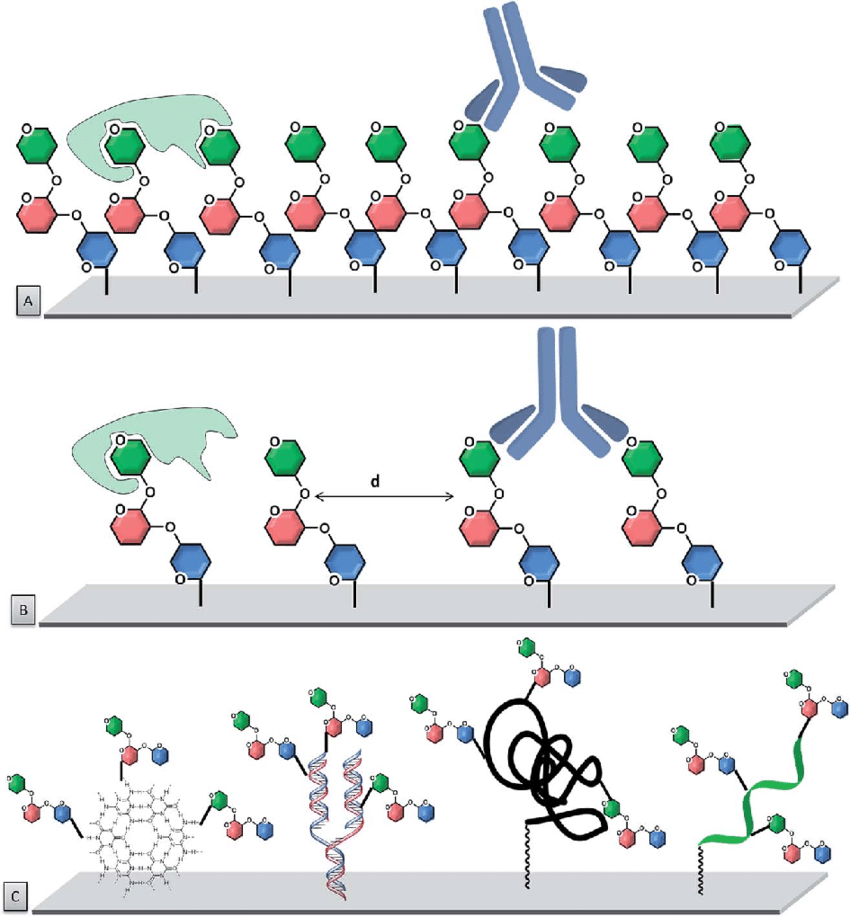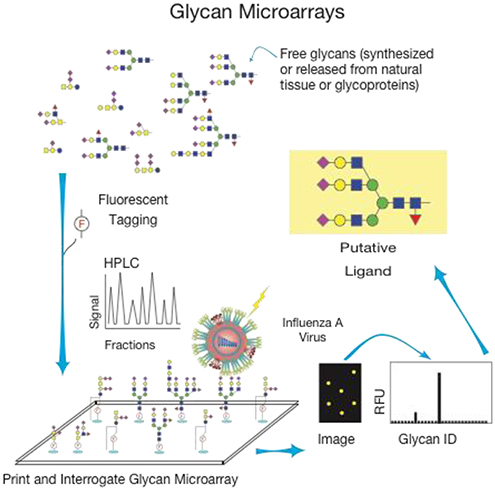Glycan Microarray Service
- Glycan–Protein Interaction Analysis
- Vaccine and Antibody Development
- Cancer and Infectious Disease Research
- Immunoregulation Studies
Glycan Microarray Service is an analysis service based on microarray technology that immobilizes various glycan molecules onto a solid support surface and conducts binding reactions with different biological molecules to study their interactions. This service enables high throughput analysis of the affinity and specificity between glycans and their binding partners and is widely applied in glycobiology, immunology, disease mechanism research, and vaccine development.

Mende M. et al. Faraday Discuss. 2019.
Figure 1. Schematic glycan presentation on microarrays.
Glycans are essential components of cell surfaces and secreted proteins and are extensively involved in biological processes such as cell recognition, immune response, and pathogen invasion. Compared with proteins and nucleic acids, glycosylation exhibits high structural diversity and spatiotemporal specificity and plays a critical role in the onset and progression of various diseases. Glycan microarray technology is an important tool for studying glycan structures, functions, and interactions. By simultaneously analyzing the binding of hundreds of different glycans to biological molecules, glycan microarrays provide an efficient and accurate analytical platform for glycomics research.
MtoZ Biolabs offers Glycan Microarray Service to systematically analyze the interactions between glycans and biological molecules such as antibodies, glycan-binding proteins, cytokines, and pathogens. This service supports customized arrays of various natural or synthetic glycans to help researchers efficiently screen for the binding specificity and affinity between glycans and target molecules.
Analysis Workflow
The main analytical workflow of the Glycan Microarray Service is as follows:
1. Sample Preparation
Samples are processed through extraction, purification, labeling, and dilution.
2. Microarray Chip Construction
Glycan molecules are selected based on the research objective, and a customized array layout is designed.
3. Incubation and Binding Reaction
Labeled samples are incubated with the glycan microarray under optimal conditions to promote specific binding.
4. Signal Detection and Imaging
High-resolution scanning equipment is used for imaging to capture binding signals and quantify interaction intensity.
5. Data Analysis and Reporting
Scanned results are analyzed to generate binding profiles, heatmaps, and other visual outputs to support deeper understanding of the interaction mechanisms between glycans and target molecules. A detailed experimental report is provided.

McQuillan AM. et al. Front Mol Biosci. 2019.
Figure 2. General method for creation and use of glycan microarrays from natural materials.
Service Advantages
High-Throughput Screening: Capable of simultaneously analyzing the binding interactions between hundreds of glycan structures and various target molecules, significantly improving experimental efficiency.
High Sensitivity: Accurately detects interactions involving low-abundance glycans, making it suitable for analyzing limited sample volumes and weak binding events.
Customizable Service Support: Offers customized array design, data analysis, and other tailored services to meet the specific needs of different research projects.
One-Time-Charge: Our pricing is transparent, no hidden fees or additional costs.
High-Data-Quality: Deep data coverage with strict data quality control. AI-powered bioinformatics platform integrates all Glycan Microarray Service data, providing clients with a comprehensive data report.
Sample Submission Suggestions
Sample Types: A variety of sample types are supported, including but not limited to purified proteins, antibodies, pathogen particles, cell lysates, and tissue extracts.
Storage and Shipping: All samples are recommended to be stored at low temperature (≤-20°C) and transported on dry ice.
Additional Notes: It is recommended to consult with MtoZ Biolabs’ technical team prior to submission to discuss project background and sample details in order to receive a detailed and tailored sample preparation and shipping guide.
Applications
Application Examples of the Glycan Microarray Service:
Characterize the binding specificity and affinity of antibodies, lectins, and viral or bacterial proteins toward specific glycan structures.
Screen glycan antigens and epitopes to support the design of glycan-based vaccines and the selection of glycan-specific antibodies.
Identify disease-associated glycan biomarkers and investigate their functional mechanisms.
Explore the roles of glycans in immune recognition and signal transduction to support research on autoimmune diseases and inflammatory conditions.
Related Services
How to order?







